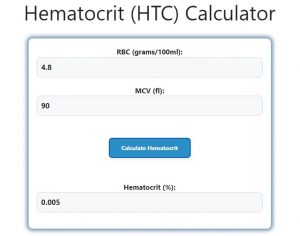About Hematocrit Calculator (Formula)
Hematocrit (HTC) is a vital indicator of the proportion of red blood cells (RBCs) in the blood. It’s essential for diagnosing and managing conditions such as anemia, dehydration, and polycythemia. The Hematocrit Calculator uses red blood cell concentration and mean corpuscular volume (MCV) to calculate this value, helping healthcare professionals assess the state of a patient’s blood health.
Formula
The formula to calculate hematocrit is:
Hematocrit = (RBC (grams/100ml) / MCV (femtoliters)) / 10
This formula calculates the hematocrit by dividing the red blood cell count by the mean corpuscular volume and then dividing the result by 10 to get a percentage.
How to Use
- Obtain RBC Count: You need to know the RBC concentration, measured in grams per 100ml of blood.
- Find MCV: Get the mean corpuscular volume (MCV) in femtoliters (fl) from a blood test.
- Apply the Formula: Use the formula to calculate the hematocrit percentage.
- Analyze the Results: Compare the result to standard hematocrit ranges to determine if it’s within the normal limits.
Example
If an individual has an RBC concentration of 4.8 grams per 100ml and an MCV of 90 femtoliters:
Hematocrit = (4.8 / 90) / 10 = 0.0533 / 10 = 0.005
This result indicates the hematocrit level, which would be compared against the standard ranges to determine any potential health issues.

FAQs
1. What is hematocrit?
Hematocrit is the percentage of red blood cells in the total volume of blood.
2. How does hematocrit affect health?
A healthy hematocrit level ensures proper oxygen transportation in the blood, and abnormal levels can indicate various medical conditions.
3. What is the normal hematocrit range?
For men, the normal range is between 38-52%, and for women, it is between 35-47%. For children, the normal range is typically 32-44%.
4. How is hematocrit calculated?
Hematocrit is calculated using the formula: (RBC in grams/100ml) divided by MCV in femtoliters, divided by 10.
5. What does a low hematocrit indicate?
Low hematocrit levels can indicate anemia, blood loss, or malnutrition, resulting in insufficient oxygen transport.
6. What does a high hematocrit indicate?
High hematocrit levels may suggest dehydration, polycythemia, or other conditions that increase red blood cell production.
7. What is the difference between RBC and hematocrit?
RBC measures the number of red blood cells, while hematocrit measures the percentage of RBCs in the blood.
8. How does MCV affect hematocrit?
MCV, or mean corpuscular volume, measures the average size of red blood cells. Larger MCV results in lower hematocrit, while smaller MCV results in higher hematocrit for the same RBC count.
9. Can dehydration affect hematocrit?
Yes, dehydration can cause an increase in hematocrit as the body loses fluid, making the RBC concentration appear higher.
10. How can I lower high hematocrit levels?
Staying hydrated, treating underlying conditions, and making dietary changes can help lower hematocrit levels.
11. How is hematocrit related to hemoglobin?
While hematocrit measures the volume percentage of red blood cells, hemoglobin measures the oxygen-carrying capacity of those cells. They are often tested together.
12. What are the risks of high hematocrit?
High hematocrit increases the risk of blood clots, which can lead to conditions like stroke or heart attack.
13. Can pregnancy affect hematocrit levels?
Yes, pregnancy can lower hematocrit levels as blood volume increases, causing dilution of red blood cells.
14. What is the treatment for low hematocrit levels?
Treatments for low hematocrit levels include iron supplements, dietary adjustments, and addressing the underlying cause such as chronic illness or bleeding.
15. How often should hematocrit be checked?
Hematocrit levels should be checked regularly if you are at risk for anemia, polycythemia, or other blood disorders.
16. Can altitude affect hematocrit?
Yes, people living at higher altitudes may have higher hematocrit levels as their bodies produce more red blood cells to compensate for lower oxygen levels.
17. How does exercise affect hematocrit?
Intense exercise can cause temporary changes in hematocrit due to fluid loss from sweat, but long-term effects depend on overall fitness and hydration levels.
18. Can medications affect hematocrit?
Yes, medications like diuretics or drugs used to treat anemia can impact hematocrit levels.
19. How can I increase low hematocrit levels naturally?
Consuming iron-rich foods, staying hydrated, and addressing any health conditions can help naturally increase hematocrit levels.
20. What are the symptoms of abnormal hematocrit levels?
Symptoms of low hematocrit may include fatigue, weakness, and shortness of breath, while high hematocrit can cause dizziness, headaches, or an increased risk of clots.
Conclusion
The Hematocrit (HTC) Calculator is a useful tool for understanding the proportion of red blood cells in your blood. By using a simple formula, you can quickly assess hematocrit levels and identify potential health issues. Regular monitoring and maintaining a healthy hematocrit level are key to good health and well-being.
Related:
